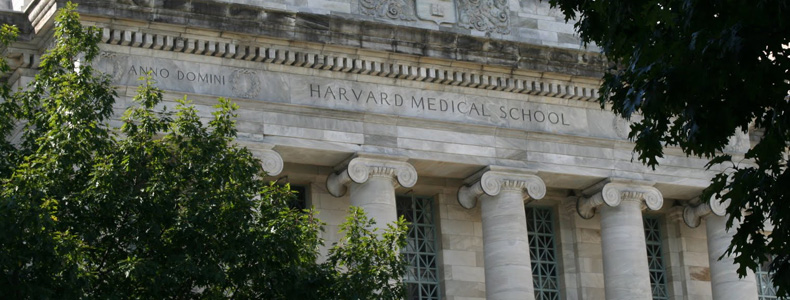
Harvard Medical School graduates, including HST MD students, celebrate placements to begin clinical training
Bobbie Collins | Harvard Medical School
Just before noon on Friday, March 15, chatter echoed off the glass-covered ceilings of the TMEC Atrium and Courtyard Café on the Harvard Medical School campus, where the largest HMS Match Day gatherings in recent memory were being held.
Anticipation built. Soon, the graduating MD students would find out where they will do their clinical training, launching their careers as physicians.
The bell rang out at noon, followed by joyous shouts as more than 600 attendees — MD students, loved ones, and HMS faculty and staff — learned where the newly matched graduates are headed next.
Julia Foote, who matched in internal medicine at the University of California, San Francisco, had tears of joy streaming down her face.
“As you can see, I’m very excited about this,” she said. “My fiancé and I originally met on the West Coast, and we have been in Boston for six years. So this is a homecoming for us.”
For this year’s graduates, who navigated medical school at the height of the COVID-19 pandemic, Match Day held extra significance.
“Match Day is exciting even under ordinary circumstances,” HMS Dean George Q. Daley told the crowd in the TMEC Atrium, which included students who started their HMS journey remotely in autumn 2020. “But your circumstances, Class of 2024, have been anything but ordinary. Indeed, they have been extraordinary.”
“All of you commenced your medical studies amidst the shock of the first year of the COVID pandemic, which makes this moment of completion very special,” he added.
Fidencio Saldaña, HMS dean for students, celebrated in the Courtyard Café with graduates who entered HMS in 2019 or earlier and have taken five or more years to complete research or additional degrees such as a master’s or a PhD.
David Velasquez, who matched in internal medicine at Brigham and Women’s Hospital, is graduating with an MBA and an MPP (master’s in public policy) in addition to an MD.
“I’ve wanted to be a doctor for many years because of my family and my friends,” he said. “Ultimately, I want to help my community.”
HMS matches by the numbers
This year, 176 HMS students matched in clinical training, internships, or residency programs, with 90 of those placing at an HMS-affiliated program. Three students matched in oral and maxillofacial surgery programs, and three will pursue nonclinical training.
The most popular specialty was internal medicine, selected by 56 students; eight of those students matched in residencies with primary care in the formal title. In other primary care-related fields, one HMS student matched in family medicine, one in medicine/pediatrics, seven in pediatrics, and 13 in obstetrics/gynecology.
Julia Rose Beatini, who matched in family medicine at Thomas Jefferson University, said, “I can’t wait to start there and become a family medicine doctor.”
Specialty care fields that students are entering include psychiatry, anesthesia, otolaryngology, radiology, surgery, and urology.
Adetomiwa Owoseni matched in anesthesiology at Northwestern University.
“I’m really excited for the chance to serve my patients and to make a difference in improving access to anesthesia around the world,” he said. “That’s what it’s really all about.”
Most of the graduates — 81 percent — will train in Massachusetts, Pennsylvania, metropolitan New York, or California. The rest will spread out across the country.
Sarah Blitz will continue her training in neurosurgery at Brigham and Women’s Hospital and Boston Children’s.
“I matched with two of my classmates, who are the best people I ever met,” she said. “I’m just so grateful for all of my family and friends to have made it here.”
How residency matching works
Unlike many professions, where hiring is on an individual basis, doctors are employed in residency positions en masse. The National Resident Matching Program (The Match) organization runs the process to ensure a fair and equitable match between graduating MDs and advanced training programs.
This year, about 45,000 graduating medical students were matched with about 42,000 positions in about 6,400 residency training programs.
Each fall, MD students apply and interview for positions in their chosen specialty. They submit a ranked list with their top choices, while residency programs submit their ranked lists of top candidates to The Match. The results are revealed at noon on the third Friday in March.
Marcia Feldman, student affairs project coordinator at HMS, manages the behind-the-scenes details that make the School’s Match Day events a success. She said this is her eleventh Match Day — and her eleventh time crying on the occasion.
“I cry because the students have worked so hard to get here — and for all the people who have supported them,” she said. “It’s their day, too.”
Images and videos: Rachelle Jeanty and Steve Lipofsky. Infographic and GIF: Maya Rucinski-Szwec
- Originally published in Harvard Medical School News and Research